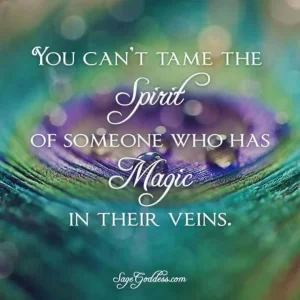Is Magic Real?
Yes It Is… And It Can Radically Change Your Life
BY
JASON LOUV
Is magic real? Yes it—here’s what magic, or “magick,” truly is, why it’s the world’s most misunderstood spiritual path, and how it can radically,
profoundly and positively change your life!
Is magic real?
That’s a question that I asked myself many years ago, when I was a young man.
I wanted to know so bad, that I ended up spending two decades searching for an answer.
And amazingly enough, it turns out that
yes—magic
is real.
So real that I decided to dedicate myself to studying, mastering, and practicing it, because I discovered that it was the
key to life itself.
Magic is also a topic that’s easily misunderstood, and that so easily gives the wrong impression—immediately conjuring images of goofballs in black robes hanging out at the local mall’s food court, or silly New Age nonsense.
Is magic real?
Yes, but it has nothing to do with any of these things.
It’s sacred, deep, and truly profound.
Magic—or, as it is properly called,
Magick, the art and science of causing change in conformity with will—is, in my opinion, one of the great gems of Western culture.
It’s the tradition that some of the great geniuses of Western history—including the originators of science—were involved in: Francis Bacon, Daniel Dafoe, William Butler Yeats, Dr. John Dee, Giordiano Bruno, Pythagoras and many, many others, whether remembered by history or not.
So is magic real?
It’s certainly been real enough to shape history, and be a subject of fascination for some of the greatest people in history.
“Magick” is the long-running sacred tradition of the West, in the same way that esoteric yoga or Tibetan Buddhism are sacred traditions in the East.
Practically speaking, it’s the path of enacting your spiritual growth
ritually,
in the day-to-day world, because that’s what tends to be healthy for people in Western cultures.
Dropping out of life and sitting up on a mountain top meditating for the rest of your life is, by-and-large, an Eastern path.
It’s an outgrowth of Asian culture and a path that can work remarkably well in the cultural context of Hinduism or Buddhism.
But people living in America, the UK, Europe or other “Western” locales by and large
do not live in a culture that supports that. (Just try it!)
We live in a culture that forces action in the world, where the path to independence, self-reliance and happiness tends to rely on rolling up your sleeves and getting stuff done in the real world.
While the Western tradition incorporates a
lot of meditation, it isn’t a path that allows escape from reality.
It’s the path of directly confronting reality, the circumstances of your life, and using those circumstances as the raw material for your spiritual growth.
Consider the legend of alchemy, in which the practitioner is spoken of as having the “magic” power of transmuting lead into gold—or even, in some versions, turning shit into gold.
This is what it’s about—taking lead, which represents mundane, boring existence, and turning it into gold.
Taking the
shit that you’re given, and turning it into gold.
Taking the raw matter of existence and making something incredible out of it.
The Western sacred tradition has been an
underground tradition for most of the last two millennia because of persecution by the Catholic Church and other religious institutions (despite, ironically, the fact that many of its adherents were historically seeking direct communion with Christ, perhaps a threat to the priesthood’s monopoly).
It has snaked its way through our history and manifested under various names and at various times as Gnosticism, Catharism, witchcraft, alchemy, Qabalah, Enochian, Freemasonry, Rosicrucianism, the Golden Dawn, Thelema, Chaos and many other forms.
The Western tradition is often given the blanket name “Magick.”
This is unfortunate in some ways, because it conjures up fanciful ideas of “magic powers” (not the point), and immediately makes people associate the Mysterium Tremendum with the following things which are bullshit:
Tacky Satanic nonsense; New Agers making silly claims; people into magic mainly as a way to accumulate jewelry and flashy clothes to one-up other outsiders; people into magic to collect books or art (see reason above); people telling you “heyyy man you don’t have to do it the hard way” despite never having done it the hard way; people using spirituality to advance a personal, cultural, financial or political agenda; religious or cult servitude; servitude to evil spirits; being into that one band that uses occult imagery; people who think they can “put spells” on other people; people who take a lot of drugs and conclude that they are special; creepy swingers who lure impressionable undergraduates into their mildewy dens of suburban sin with the promise of “real power!!!1”
Magick has nothing to do with any of this.
It does have to do with:
Hard work, perseverance, study, discipline, self-sacrifice, years and years of painful trial-and-error learning, humility, constant adaptation and evolution, devotion to your own integrity, learning to let go.
There are no hard and fast rules on how to do that—and the details are different for every single individual.
But there are guidelines and practices that help.
Broadly, you live a magical life by:
- Disciplining your body, mind and spirit;
- Figuring out what you’re here for—your unique purpose for existing (note that this is a continuum, and evolves over time);
- Using the discipline developed in Step 1 to accomplish Step 2, understanding that when you Do your True Will, or engage in your reason for existing, life makes a whole lot more sense.
It’s not necessarily easier, but it’s
infused with meaning, a major accomplishment in a world where people drift through seas of endless meaninglessness.
Is magic real?
Yes it is, if you actually practice it, and have the discipline to make it real!
The best way to find out is to discover the answer for yourself.























